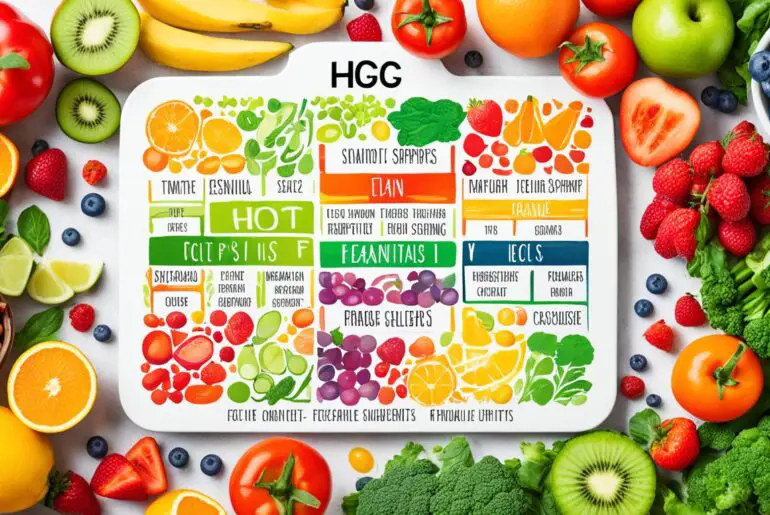Did you know that about 70% of women struggle to lose weight after giving birth?
Losing weight after pregnancy can be challenging, but the HCG diet has gained popularity as an effective weight loss plan for new moms. The HCG diet involves taking the hormone human chorionic gonadotropin (hCG) and following a low-calorie diet. While the HCG diet promises quick results, it’s essential to understand the science behind it and consider safe and sustainable weight loss strategies.
Key Takeaways:
- The HCG diet is a weight loss plan that combines hCG hormone supplementation with a low-calorie diet.
- About 70% of women struggle to lose weight after giving birth, making postpartum weight loss a common concern.
- The effectiveness and safety of the HCG diet for weight loss are still debated among researchers.
- Consulting with a healthcare professional is essential before starting the HCG diet or any weight loss plan postpartum.
- Weight loss after pregnancy should focus on a balanced diet, regular exercise, adequate sleep, and support from healthcare professionals or support groups.
Understanding hCG in Pregnancy and Weight Loss
During pregnancy, the hormone human chorionic gonadotropin (hCG) is produced in significant amounts. Its primary function is to support the development of the fetus and ensure the well-being of the mother. Specifically, hCG plays a crucial role in maintaining the corpus luteum, a temporary endocrine structure that produces progesterone.
While hCG is primarily associated with pregnancy, researchers have also explored its potential role in weight loss. Studies have suggested that hCG may influence the hypothalamus, a brain region responsible for regulating hunger and metabolism. This modulation of hunger and potential impact on fat metabolism have contributed to the development of the HCG diet, a controversial weight loss plan.
Preliminary studies indicate that hCG may have an effect on the hypothalamus, leading to reduced hunger and increased fat metabolism. These findings have driven the use of hCG in weight loss programs, such as the HCG diet.
However, it is important to note that the efficacy and safety of hCG for weight loss are still subjects of debate. While some studies have reported positive outcomes, not all research aligns on its effectiveness. More extensive and well-controlled studies are needed to provide a definitive understanding of hCG’s role in weight loss.
Furthermore, hCG’s precise mechanisms of action for weight loss remain unclear. It is believed that hCG may stimulate the breakdown of body fat, particularly adipose tissue, for energy utilization. However, the extent of hCG’s impact on weight loss and its potential metabolic role requires further investigation.
The Role of hCG in Weight Loss
The HCG diet revolves around the administration of hCG, typically through injections, alongside a heavily calorie-restricted diet. The theory behind this approach is that hCG promotes weight loss by modulating hunger and facilitating the utilization of stored body fat.
Despite the popularity of the HCG diet, it is essential to approach it with caution. The Food and Drug Administration (FDA) has not approved hCG for weight loss, and over-the-counter hCG products are not legal. Additionally, following such a low-calorie diet, typically limited to 500 calories per day, can be challenging and may not provide sufficient nutrients, particularly for new mothers.
It is crucial to consult with a healthcare professional before considering the HCG diet or any weight loss plan. They can provide personalized guidance based on individual health needs, ensuring safety and effectiveness.
Next, let’s delve into the three distinct phases of the HCG diet for a comprehensive understanding of its structure and potential benefits.
The Three Phases of the HCG Diet

The HCG diet follows a structured approach that consists of three distinct phases: the loading phase, weight loss phase, and maintenance phase. Each phase has a specific purpose and plays a vital role in the overall success of the diet.
1. Loading Phase
The loading phase of the HCG diet lasts for two days. During this phase, individuals are encouraged to consume a high-calorie diet to prepare their bodies for the upcoming calorie restriction. This phase aims to replenish glycogen stores and ensure the body is adequately fueled before entering the weight loss phase.
While it may seem counterintuitive to consume excess calories at the beginning of a diet, this phase serves to jumpstart the metabolism and prevent hunger during the early stages of calorie restriction.
2. Weight Loss Phase
The weight loss phase is the core of the HCG diet. It typically lasts between three to six weeks, depending on individual goals and progress. During this phase, individuals follow a low-calorie diet of 500-800 calories per day while simultaneously taking hCG supplementation.
The primary goal of the weight loss phase is to promote fat metabolism and suppress appetite. hCG is believed to modulate hunger signals and facilitate the breakdown of stored body fat for energy. This phase requires strict adherence to the prescribed calorie restriction and specific food choices.
Here is an example of a typical HCG diet meal plan during the weight loss phase:
| Meal | Food Choices |
|---|---|
| Breakfast | 100g of lean protein (such as chicken breast) + a serving of vegetables (such as spinach or asparagus) |
| Lunch | 100g of lean protein + a serving of vegetables |
| Afternoon Snack | A small amount of fruit (such as an apple or a handful of strawberries) |
| Dinner | 100g of lean protein + a serving of vegetables |
3. Maintenance Phase
The maintenance phase marks the transition from the weight loss phase to long-term weight maintenance. It typically lasts three weeks and gradually increases calorie intake while discontinuing hCG supplementation.
The goal of the maintenance phase is to stabilize weight and establish healthier eating habits. This phase allows individuals to reintroduce additional food choices and gradually increase calorie intake without regaining the lost weight. The focus shifts from rapid weight loss to weight maintenance and a sustainable lifestyle.
During the maintenance phase, it is essential to continue making wise food choices, practice portion control, and incorporate regular physical activity to support long-term weight management.
In the next section, I’ll discuss how to approach the HCG diet, including important considerations and steps to follow for a successful journey.
How to Approach the HCG Diet
Before considering the HCG diet, it is essential to have a consultation with a healthcare professional. This step ensures that the diet plan is a safe option and aligns with your individual health needs and goals. Consulting with a qualified healthcare provider will provide you with the necessary guidance and support throughout your weight loss journey.
During the consultation, your healthcare provider will discuss the dosage and administration of hCG, whether through injections, drops, or pellets. It is crucial to follow the prescribed dosage and administration method to maximize the potential benefits of the HCG diet.
To successfully embark on the HCG diet, creating a well-balanced and nutritious meal plan is key. This meal plan should adhere to the calorie restrictions of the HCG diet while providing adequate nutrition to support your overall health. Consider incorporating lean proteins, vegetables, fruits, and whole grains into your meal planning to ensure a well-rounded diet.
Monitoring your progress is an essential part of the HCG diet. Regularly track your weight and overall well-being to gauge the effectiveness of the diet and make necessary adjustments. It is crucial to discuss any concerns or adverse effects with your healthcare provider during these monitoring sessions.
Remember, the HCG diet is a comprehensive weight loss plan that requires careful consideration, consultation, and monitoring. By following these steps and working closely with your healthcare provider, you can approach the HCG diet with confidence and increase your chances of achieving your weight loss goals.
Consultation and Dosage Administration
Consultation with a healthcare professional is crucial before starting the HCG diet. They will provide valuable guidance and support throughout your weight loss journey. It is important to follow the prescribed dosage and administration method of hCG.
Meal Planning and Monitoring Progress
Creating a well-balanced and nutritious meal plan that adheres to the calorie restrictions of the HCG diet is essential. Regularly monitoring your weight, overall well-being, and discussing any concerns with your healthcare provider will help ensure the effectiveness and safety of the diet.
Considerations for Weight Loss after Pregnancy
After childbirth, it is important to give your body enough time to recover before embarking on a weight loss journey. Generally, healthcare professionals recommend waiting at least six weeks after giving birth to start a weight loss diet. During this time, your body undergoes significant changes, and it needs sufficient rest and nourishment to heal properly.
Consulting with a healthcare professional and a dietitian is crucial to develop a safe and effective weight loss plan tailored to your specific needs. They can provide guidance on the appropriate caloric intake, nutrient requirements, and meal planning strategies that will support your overall health and well-being.
If you are breastfeeding, it is essential to consider the impact of your diet on both your own health and your baby’s. Nutrient-rich foods are vital to ensure an adequate milk supply and meet the nutritional needs of both you and your little one. A balanced diet that includes a variety of fruits, vegetables, lean proteins, and whole grains will provide the necessary nutrients for postpartum recovery and healthy weight loss.
Getting enough sleep is also crucial during this time. Lack of sleep can interfere with proper hormone regulation, increase cravings for unhealthy foods, and hinder weight loss efforts. Prioritizing quality sleep and finding ways to rest and recharge will contribute to your overall well-being and support your weight loss goals.
The Importance of Setting Sustainable Goals
Setting realistic and sustainable goals is key to successful weight loss after pregnancy. It is important to remember that your body has undergone significant changes, and it will take time to achieve your desired weight loss. Rapid weight loss can be detrimental to your health and may not be sustainable in the long run.
Instead of focusing solely on the number on the scale, consider setting goals that encompass overall health and well-being. Aim to incorporate regular physical activity into your routine, such as walking, yoga, or postpartum exercises. Prioritize self-care and allow yourself time to adjust to your new role as a mother.
Joining a support group or seeking support from other new moms can be incredibly beneficial during your weight loss journey. Connecting with others who are going through similar experiences can provide encouragement, motivation, and valuable tips. Online forums, social media groups, or local mom communities are great resources for finding support.
Remember, sustainable weight loss takes time and patience. Listen to your body, be kind to yourself, and celebrate each milestone along the way. With the right mindset, support, and a balanced approach to nutrition and self-care, you can achieve your post-pregnancy weight loss goals while prioritizing your overall health and well-being.
| Considerations for Weight Loss after Pregnancy |
|---|
| Give your body enough time to recover before starting a weight loss diet |
| Consult with a healthcare professional and a dietitian for guidance |
| Pay attention to nutrient intake, especially if breastfeeding |
| Get enough sleep to support overall well-being and weight loss |
| Set realistic and sustainable goals for healthy weight loss |
| Join a support group or seek support from other new moms |
Post-Pregnancy Weight Loss Tips

To naturally lose weight after giving birth, new moms can consider several tips. Staying hydrated can help speed up metabolism and reduce hunger. Incorporating exercise, such as weight training or aerobics, gradually after healing can aid in calorie burning and overall health. Getting enough sleep plays a role in weight management as sleep deprivation can lead to increased hunger. Setting realistic goals and focusing on a balanced diet with nutrient-rich foods, including fruits, vegetables, lean proteins, and complex carbohydrates, can support post-pregnancy weight loss.
Here are some weight loss tips for new moms:
- Hydration: Stay hydrated by drinking plenty of water throughout the day. Adequate hydration can help speed up metabolism and reduce feelings of hunger.
- Exercise: Gradually incorporate exercise into your routine after receiving clearance from your healthcare provider. Engaging in activities like weight training or aerobics can aid in burning calories and improving overall health.
- Sleep: Prioritize getting enough sleep as it plays a role in weight management. Sleep deprivation can lead to increased hunger and hinder weight loss efforts.
- Realistic Goals: Set realistic and achievable goals for weight loss. Remember that healthy weight loss is gradual and sustainable.
- Breastfeeding: If you are breastfeeding, ensure you are consuming enough calories to support both your health and your baby’s needs. Discuss with your healthcare provider or a registered dietitian to create a balanced meal plan.
| Tips for Post-Pregnancy Weight Loss | Description |
|---|---|
| Stay Hydrated | Drinking enough water helps speed up metabolism and reduces hunger. |
| Incorporate Exercise | Gradually add exercise to your routine to burn calories and improve overall health. |
| Get Enough Sleep | Prioritize sleep to manage weight. Lack of sleep can increase hunger. |
| Set Realistic Goals | Set achievable weight loss goals to ensure a healthy and sustainable approach. |
| Focus on Balanced Diet | Eat nutrient-rich foods, including fruits, vegetables, lean proteins, and complex carbohydrates. |
Remember, post-pregnancy weight loss should be approached with patience and care. Consult with your healthcare provider to develop a personalized plan that suits your specific needs and goals.
Conclusion
The HCG diet, a controversial weight loss plan involving human chorionic gonadotropin supplementation and a low-calorie diet, is a topic that requires careful consideration. While some studies suggest positive outcomes, it is essential to approach the HCG diet with caution and seek guidance from a healthcare professional. Sustainable weight loss after pregnancy requires a comprehensive approach, including a balanced diet, regular exercise, adequate sleep, and support from healthcare professionals or weight loss groups.
Prioritizing overall health and well-being is crucial during the postpartum weight loss journey. Rather than relying solely on trendy diets like the HCG diet, effective and safe weight loss strategies involve creating a sustainable lifestyle that promotes long-term success. By adopting a balanced diet that includes nutrient-rich foods and engaging in regular physical activity, new moms can achieve their weight loss goals in a healthy and safe manner.
It is important to remember that every individual’s postpartum weight loss journey is unique. Seeking the guidance of a healthcare professional will ensure that weight loss efforts are tailored to personal needs and circumstances. Additionally, finding a support system, whether through friends, family, or online communities, can provide valuable encouragement and motivation throughout the process.
FAQ
What is the HCG diet?
The HCG diet is a weight loss plan that involves taking the hormone human chorionic gonadotropin (hCG) and following a low-calorie diet.
Does the HCG hormone contribute to weight loss?
Scientific evidence suggests that weight loss on the HCG diet is primarily due to the low-calorie restriction rather than the hormone itself.
How many calories are allowed on the HCG diet?
The HCG diet limits daily calorie intake to 500 calories and allows for two meals consisting of protein, vegetables, bread, and fruit.
Has the FDA approved hCG for weight loss?
No, the FDA has not approved hCG for weight loss, and over-the-counter hCG products are not legal.
Is the HCG diet safe for new moms?
Following such a low-calorie diet may not meet all nutritional needs, especially for new moms. It is essential to consult with a healthcare professional before starting the HCG diet.
How does hCG function in pregnancy?
Human chorionic gonadotropin (hCG) is a hormone produced during pregnancy that supports fetal development and maintains the corpus luteum.
Is there scientific evidence supporting the use of hCG for weight loss?
Preliminary studies suggest that hCG may influence hunger and fat metabolism, but more research is needed to confirm its efficacy and safety.
What are the three phases of the HCG diet?
The HCG diet consists of the loading phase, weight loss phase, and maintenance phase, each playing a vital role in the overall diet plan.
When should I consult a healthcare professional before starting the HCG diet?
It is crucial to consult with a healthcare professional to ensure the HCG diet is safe for you and aligns with your health needs and goals.
How should hCG be administered in the HCG diet?
The dosage and administration of hCG, whether through injections, drops, or pellets, should be followed as prescribed by a qualified healthcare provider.
How can new moms approach weight loss after pregnancy?
New moms should wait at least six weeks after giving birth and consult with a healthcare professional and dietitian to develop a safe and effective weight loss plan.
What are some post-pregnancy weight loss tips?
Tips for natural weight loss after pregnancy include staying hydrated, incorporating exercise gradually, getting enough sleep, setting realistic goals, and focusing on a balanced diet with nutrient-rich foods.




